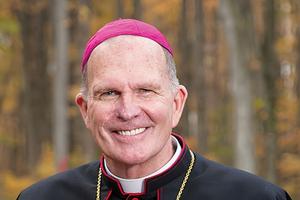The Power of Jesus Christ Is Proclaimed in Patience and Suffering
‘You proclaim by your patience, your endurance and your joy the mystery of Christ’s redeeming power. You will find the crucified Lord in the midst of your sickness and suffering.’ —Pope St. John Paul II

I have constant pain. I’m sure there are others who have more pain than I do, but I’m sure I have more pain than many.
A quick summary: My spinal pain, even after two surgeries, has persisted for about 12 years. I need morphine to get through the day. Then liver cancer was diagnosed six years ago, which likely affects my immune system and leaves me more tired than I should be.
Then in December, I thought I was having a toothache. That would be easy to deal with. However, it turns out it has nothing to do with my teeth but something wrong on the left side of my face. At its best I feel like I was gently slapped in the face by a 2-year-old; when it’s bad, it feels like I was slapped by Mike Tyson. One day driving home it almost made me run off the road. I’m now in the process of trying to find out what it is. I call it going down the rabbit hole: MRIs, specialists and other specialists. I’m prepared for some vague answer. Maybe take Advil.
When this more recent pain started, I was angry. I did the whole “Why me, Lord” thing. Haven’t I suffered enough? The facial pain, when it ramps up, makes it hard to read, concentrate and even converse.
Yet I realized that this new challenge has somehow been integrated into my life. I don’t like it but it doesn’t upset me. The same is true with my other ailments. Over time the spine and the cancer are no longer things to complain about or feel self-pity over, but just part of my life.
For me, it meant making a choice: deal with it or be crushed by it. This is still my life and I want to make the most of it.
I reflected on this recently because two people I know have friends who have undergone life-changing medical conditions. Both were active, like I used to be, and now are not. Like me years ago, they can’t accept what’s happening. They are now dependent on others, and that bothers them. They find it humiliating and embarrassing to always ask for help, and I used to feel the same way. One needed a walker and it’s taken a year for him to use it.
I feel for these people because I know what it’s like to see a great life torpedoed.
I believe I know what they need to do because I had to learn it myself.
I had to give up a great journalism career, yearly hiking trips in the Rockies and cycling. I had to give up the dream of more travel. I loved volunteering at a hospice but constant pain and illness ended that for me. I also had to give up much of my social life. My wife, Kathryn, has been a great unselfish helper. In the beginning, and if I’m honest, even now, I feel a bit ashamed. For example, when she must put out garbage bins in the street — these bins are heavy and I always worry I’m making Kathryn do the work a man should be doing. I worry about what the neighbors think.
Since I’m not a saint I don’t beat myself up for feeling this way. It’s a vestige from the start of my pain journey. I’ve improved in my ability to accept what I am today. And acceptance, I believe, is an exercise in patience.
I found a quote from St. Thomas Aquinas online. Of course, it’s wise. Everything from the Angelic Doctor is wise. He writes:
Patience is a virtue attached to the virtue of fortitude, which hinders a man from departing from right reason illumined by faith by yielding to difficulties and to sadness.
I also found this online though I can’t find who said it. It doesn’t matter because these words are also instructive and wise:
The three grades of patience are: to bear difficulties without interior complaint, to use hardships to make progress in virtue, and even to desire the cross and afflictions out of love for God and accept them with spiritual joy.
As a Catholic, I have had the privilege to advance in prayer. My knowledge and love of the faith have grown and I see Mass as the highlight of my week. It helps to have faith. I now have a lot of free time and I’ve learned to love that.
To the two people mentioned above, I would like to say to them a few things: First, fight despair. Despair will do us no good; in fact, it will make us miserable, which will ruin our life.
I would say to look at all the people passing by on the street. Look at how many are in wheelchairs, using canes, walking incredibly slow and at times grimacing when a bolt of pain hits them.
Then I would ask them what they would say to these walking wounded. Would they encourage them or discourage them? And if they answered that they would encourage them, then why would they not apply that to themselves?
Finally, trust in God. Read Job. Pray without expecting a cure, but pray for comfort and assurance. We’re in God’s hands and God is never wrong.

















